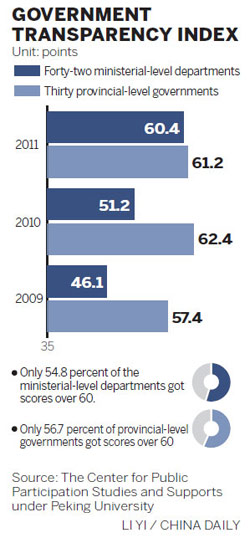Govt transparency improves, research finds
17 January 2013
Most central government departments have met legal requirements on transparency in the past year, but there is still a long way to go, according to a research report released on Friday.

Thirty-eight out of 42 ministerial-level departments under the State Council improved their transparency in 2011, according to an annual report on government transparency, released by the Center for Public Participation Studies and Supports under Peking University.
Forty-two departments scored an average 60.4 points out of 100, up from 51.2 points in 2010 and 46.1 points in 2009.
“The improvement is inseparable with the central government’s drive in past years to promote transparency,” said Wang Xixin, director of the center and a law professor at the university.
Wang said it is also a result of top-to-bottom government reform and bottom-to-top public supervision.
The Ministry of Transport scored the highest, 77.5 points, followed by the Ministry of Environmental Protection’s 75.5 points.
At the bottom of the list are the State Tobacco Monopoly Bureau, 49.5 points; the Ministry of Railways, 47 points; and the Ministry of Supervision, 23 points.
The center collaborated with seven other universities across China to observe transparency in 42 ministerial-departments of the State Council as well as 30 provincial-level governments and many county-level governments from November 2011 to August 2012.
This is the third time the center cooperated with the China Center of the Yale Law School to lead the observation project.
The project team sent 1,694 requests to government agencies for information disclosure in preparing the 2011 report.
Mitchell Pearlman, a government consultant and law professor at the University of Connecticut, said the report, which is sophisticated in methodology and analysis, has painted a “very positive picture of the situation in China compared with other countries”.
“For example, the level of compliance is substantially higher than similar surveys I’ve seen in the United States,” Pearlman said.
Privacy and national security are very important in the US as they are in China, so some information that would be involving privacy and sensitive could not be made public, he added.
He added that China has come a long way in promoting transparency and he is encouraged to see more positive improvement on the regard.
Jiang Ping, former president of the China University of Political Science and Law, on Friday emphasized citizens’ right to know is the basis to participate in politics.

Recent Comments